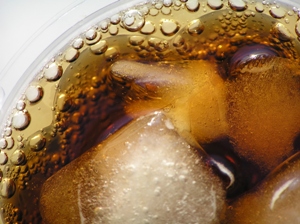20% sugary drink tax could cut UK obesity numbers by 180,000
Release Date 01 November 2013

The number of obese adults in the UK could be reduced by 180,000 with a 20% tax on sugary drinks, say researchers at the University of Oxford and the University of Reading. The tax could raise over £275 million for the Treasury.
The researchers from the British Heart Foundation Health Promotion Research Group at the University of Oxford and the Centre for Food Security at the University of Reading have published their findings in the British Medical Journal.
A tax on sugary drinks has been proposed as a public health measure for a number of reasons. Sugary drinks (soft drinks with added sugar such as fizzy drinks, squashes and cordials) have been shown to increase the risk of obesity, diabetes, cardiovascular disease and tooth decay. They only suppress appetite weakly, so consuming fewer sugary drinks is unlikely to result in an increased intake of other sources of calories. There are no beneficial nutrients in sugary drinks, so reducing consumption will not remove important nutrients from the diet. And from a legislative perspective, sugary drinks can be clearly defined, the researchers say.
The scientists used a large survey of shopping preferences of families in the UK to estimate how purchases of sugary drinks would change in response to a 20% increase in their price.
They also looked at how purchases of other drinks, such as orange juice, milk and diet drinks, might change in response to the price change. They then used this information to estimate the change in average calorie intake and obesity
The research suggests that purchases of sugary drinks would reduce by around 15% with people mainly switching to diet drinks and tea and coffee. The expected reduction in energy intake is 28 calories per person per week.
The researchers estimate this would reduce the number of obese adults across the population by 180,000 (with the number likely to be in a range from 110,000 to 250,000), or 1.3% of all obese adults in the UK.
The impact on obesity is likely to be much greater in younger adults who drink larger quantities of sugary drinks than older adults. On average, people aged 16-29 years drink around 300 ml of sugary drinks per day, compared to just 60 ml in those aged over 50.
The Oxford and Reading research team also investigated the effect on obesity among different income groups. The study indicates that there would be similar health gains across all groups, looking at the thirds of the population with lowest, middle and highest incomes.
The estimated increase in the amount people would spend on drinks would be an extra 9p a week (or under £5 a year) for those in the lowest income group. It would be 6p per week for those in the highest income group. The increase in expense is small as most people would react to the tax by purchasing fewer sugary drinks, the study suggests.
Professor Richard Tiffin, director of the Centre for Food Security at the University of Reading, was a co-author on the study.
He said: "Obesity is a ticking time bomb. Doing nothing risks condemning millions of people to poor health and an early grave. This is a complex battle in which a soft drinks tax could be a useful weapon, but on its own would not go far enough in the face of such a massive problem. Sedentary lifestyles, poor education, addiction to alcohol and tobacco, and poverty all play far more significant roles than fizzy drinks in causing bad health.
"Taxing food is a big step, especially when spiralling bills are already making households poorer, and will make very little difference if people are unable or unwilling to make healthier choices elsewhere in their lives."
ENDS
For more information please contact Pete Castle at the University of Reading press office on +44 (0)118 378 7391 or p.castle@reading.ac.uk.
Notes to Editors
-
The paper ‘The overall and income specific effect on the prevalence of overweight and obesity of a 20% sugar sweetened beverage tax in the UK: an econometric and comparative risk assessment modelling study' by Adam Briggs, Oliver Mytton, and colleagues is to be published in the journal BMJ with an embargo of 23:30 UK time / 19:30 US Eastern time on Thursday 31 October 2013.
-
Richard Tiffin and Ariane Kehlbacher have previously received research grants from the Union of European Soft Drinks Association. Mike Rayner is chair of Sustain, a food, farming and health charity. Mike Rayner and Peter Scarborough are supported by the British Heart Foundation.
-
A 20% tax would put around 12p on a 330ml can of fizzy drink bought in a supermarket or about 40p on a 2L bottle.
-
A typical sugary drink can contain 6 to 15 teaspoons of sugar (see table below). One teaspoon of sugar is equivalent to 4g of sugar or 16 calories.
-
Around 28% of the UK adult population is now obese, with about 65% either overweight or obese. Several UK health bodies, including Sustain, the Academy of Medical Royal Colleges, and the UK Health Forum, have called for taxes to be introduced as one way to reduce consumption and prevent health problems like obesity and diabetes.